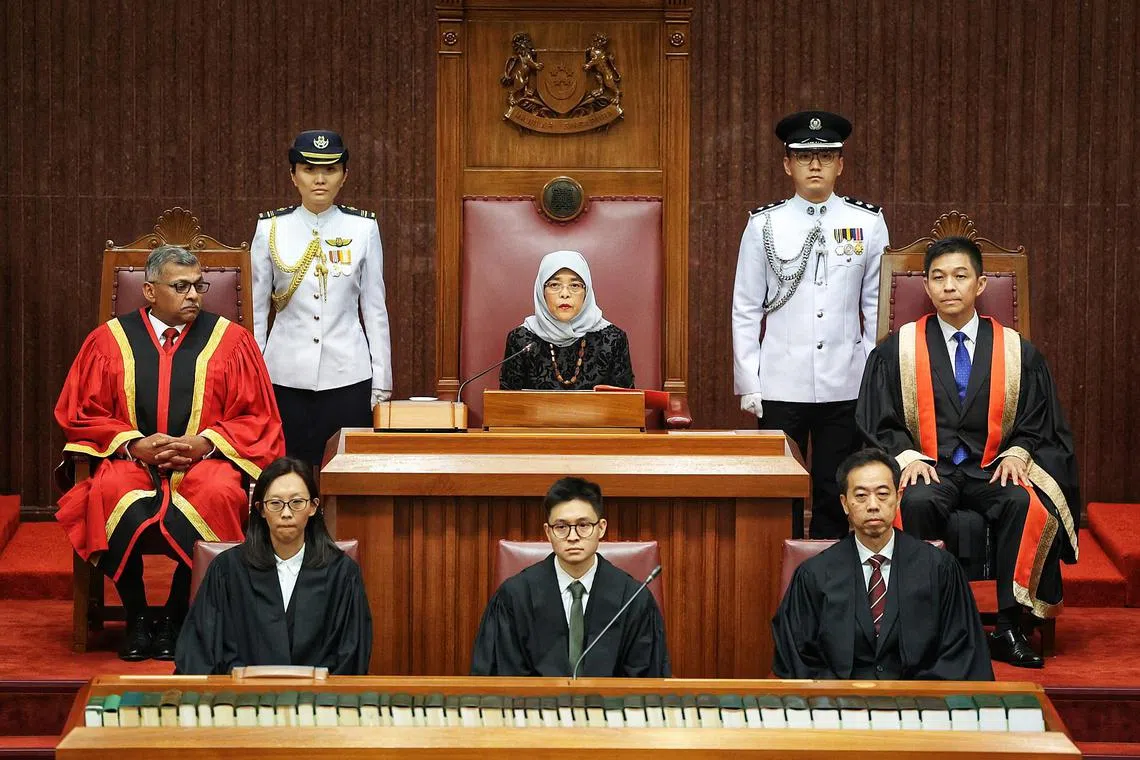Broaden meritocracy to combat social stratification: President Halimah outlines key priorities for Govt
Sign up now: Get ST's newsletters delivered to your inbox

President Halimah Yacob, flanked by Speaker of Parliament Tan Chuan-Jin (right) and Chief Justice Sundaresh Menon (left), addressing Parliament on April 10, 2023.
PHOTO: MCI
Follow topic:
SINGAPORE – The Republic must not allow advantages and privileges to become entrenched and persist over generations, said President Halimah Yacob in a speech in Parliament on Monday.
Instead, the idea of meritocracy, long the organising principle of Singapore society, should be broadened and made more open, she added. This is important as Singapore seeks to overcome the tendency for societies to become more stratified
Hence, there is the need to expand opportunities throughout life for every citizen, regardless of his starting point, she said as she outlined four key priorities for the remainder of this term of government, as well as the key values that will shape its agenda.
These are combating stratification, improving social safety nets, continuing to build a green, liveable city and helping Singaporeans collectively shape the new compact that reinforces their responsibilities to one another.
Madam Halimah was delivering the President’s Address, which marks the start of the new session of the 14th Parliament as it returns from a two-week recess.
She said Singapore has to rethink its approach to education and work.
While the Government will continue to prepare children for the future, with more support from the early years for children who start out with less, it recognises the competitive stresses that have built up in the education system.
“We will provide everyone with access to a good education, and many chances in life to learn and improve. But let us not be unwittingly drawn into an educational arms race, and end up worse off as a society,” she said.
Society must also re-examine how it rewards different skills and talents, and recognise the full range of pathways to success, such as the value of work done by those who contribute through technical and practical abilities
The Government will also step up support for the disadvantaged and vulnerable segments, such as lower-income workers and families, as well as persons with disabilities, she added.
The second key priority is to improve social safety nets so that Singaporeans can better cope with disruptions and setbacks in life, said Madam Halimah.
With a more uncertain global economy and faster changes in technology, workers – especially those in their 40s and 50s – are at higher risk of unemployment
She said the Government will look at how to extend support to such people, similar to the way it did during the Covid-19 pandemic.
The SkillsFuture ecosystem will also be further strengthened to bring everyone along on the digitalisation and industry transformation journey, she said.
As the number of seniors rises, the Government will seek to enhance their retirement adequacy
It will also keep public housing affordable and accessible for Singaporeans,
The third key priority for the remainder of the term of Government is to press on with longer-term efforts to build a green, connected and highly liveable city, she said.
The urban landscape will continue to be renewed and transformed, with plans integrated into the Smart Nation vision, she added.
The city should also become more people-friendly,
“We will strengthen the distinctive cultures and heritages of different neighbourhoods. We will have better-connected streets and green spaces that are conducive for walking and cycling, where people can meet, interact and connect with one another,” she said.
“We will make our housing estates more vibrant spaces where children grow up together, where shared memories are formed, and where we nurture our unique identity as a multi-racial and multi-religious nation.”
The fourth key priority for the Government will be to strengthen collective responsibility to shape the new compact. This will help to deepen Singaporeans’ sense of shared identity and mutual responsibility towards one another.
“More government action should not result in a greater sense of dependency and entitlement. Instead, the Government will, through its actions, reinforce individual and family efforts, and bring forth contributions from other stakeholders,” said Madam Halimah.
For example, employers must do their part to invest in their workers, while community partners must complement government efforts to support vulnerable families.
To tackle the complex challenges ahead, Singapore will need a stronger network of stakeholders to participate in nation building, she said.
Citizens must also take ownership of issues, which can already be seen in the youth who show strong interest in taking action and initiating change

She noted that these four key priorities tie back to the Forward Singapore nationwide engagement exercise,
The exercise is meant to reaffirm the core values held dear by Singaporeans – fairness, inclusivity, mutual support and the desire to give back to society – which shape the Government’s agenda.
Said Madam Halimah: “We want every person to be treated equally with dignity and respect. We want a Singapore where everyone belongs, and every citizen has the chance to achieve his or her fullest potential.
“We want a society that values and supports families; where we care for and help one another, and pitch in to make a difference to our community.”
Following Madam Halimah’s address, the various ministries from Tuesday to Friday will unveil more details of their respective plans in public statements known as Addenda to the President’s Address. The House will begin a five-day debate on the address from April 17.


